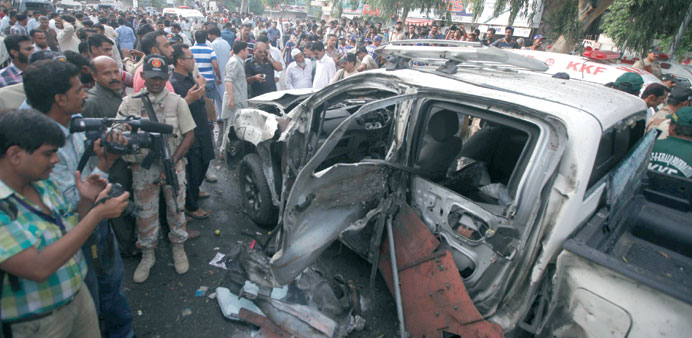Security personnel and media members are seen at the site of suspected suicide bomb attack in Karachi yesterday.
Agencies/Islamabad
One of Pakistani President Asif Ali Zardari’s most trusted aides was killed in a suspected suicide bombing in the volatile port city of Karachi yesterday as he stopped his armoured vehicle to buy some fruit, police said.
Pakistan has suffered a spate of bombings since Prime Minister Nawaz Sharif was sworn in last month, underscoring the challenges facing the nuclear-armed nation in taming a Taliban-linked insurgency.
A police officer in Pakistan’s financial capital said Bilal Shaikh - Zardari’s security chief who was always spotted next to the president during public appearances - was killed along with two others in a prosperous area of eastern Karachi.
“It seems that the suicide attacker walked up to Bilal Shaikh’s vehicle and blew himself up outside the front passenger seat of the vehicle where Shaikh was seated,” the senior police officer, Raja Umar Khattab, said. The bomb was so powerful it shattered the bullet-proof vehicle in which Shaikh had been travelling. Shaikh, his driver and a passer-by were killed.
About a dozen other people were wounded.
A police escort was accompanying Shaikh’s white armoured sports utility vehicle when the attack took place. Police said an unidentified attacker walked up to the car and blew himself up just as Shaikh opened the door to get out.
No one immediately claimed responsibility for the attack, which took place on the eve of the start of the holy Muslim month of Ramadan that is observed in Pakistan from today.
The bomb exploded in a middle-class neighbourhood in central Karachi, close to an office for Zardari’s Pakistan People’s Party (PPP), which rules southern Sindh province.
Zardari was at his official residence around 10km away when the attack happened, officials said.
The latest wave of attacks across Pakistan has brought an end to a period of relative calm after Pakistan’s first ever transition between elected civilian governments that brought Sharif to office for the third time in a May election.
Last weekend, at least five people were killed when a bomb ripped through a busy restaurant street in Lahore, wounding dozens as people sat to dinner in the old part of Sharif’s home city.
On June 30, at least 28 people were killed in the southwestern city of Quetta when a suicide bomber attacked a largely Shia Muslim neighbourhood, highlighting growing sectarian tensions in the country of 180mn.
Shaikh - who had survived an earlier assassination attempt near his home in Karachi about a year ago - used to change his routes several times while travelling around one of Pakistan’s most violent cities.
Like Zardari, he belonged to the Pakistan People’s Party, which had been in power before the May election. Taliban-linked militants had previously targeted the secular party.
Both Zardari and Sharif have issued separate statements condemning the attack, a private television channel reported.
Shaikh had been in charge of security for Zardari’s wife, former prime minister Benazir Bhutto when she returned to Karachi from exile on October 18, 2007. She was assassinated by a gun and suicide attack on December 27, 2007.
Shaikh had also been in charge of Zardari’s private residence in the capital Islamabad.

